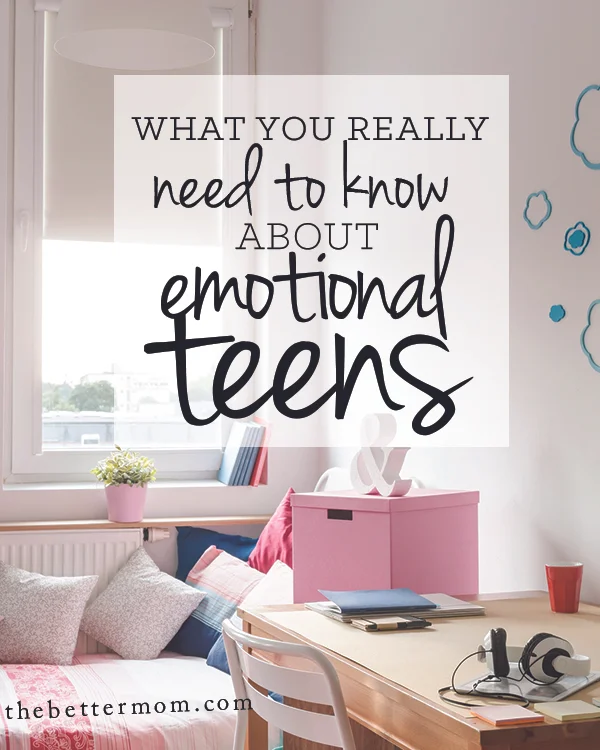How Parents Can Handle Teen Emotions
On the top of my to-do list today was writing this blog on how to handle emotional teens. It’s easy to make that a goal and spout all types of wonderful advice on a good day. But today has not been a good day.
One of my teens has been especially sassy and confrontational. At fifteen she’s usually a complaint kid, but last week she’s been testy and moody. Today has been by far the worst of it, and after her sassy attitude and disrespectful words, I sent her to her room, and I also retreated to my room for a good cry.
As hard as I try to hold myself together around my kids—and not get angry and emotional myself—I still get mad. Why in the world do I have to deal with this? I also still get upset. I don’t deserve to be treated this way … after all that I do for my kids. The tears are falling even as I write this.
There are many reasons why teens are emotional, and I’m the first to tell you that negative emotions shouldn’t be ignored. There’s something going on deep within my daughter today. It may just be hormones, but then again, it could be something more. I know that later, when we’re both in a more stable mood, I’ll need to talk to her about what’s really going on. That’s the mom thing I need to do, even when I don’t feel like it. When dealing with an emotional teen, it’s important to dig in and pull close to your teen, even when you feel like pulling away.
Big emotions give hints.
Often teens don’t know how to deal with their emotions, but their actions often can give us hints of what’s really going on. Talks of suicide—or self-harm such as cutting, drinking and eating disorders—should not be ignored. It’s not just a “phase.” Exploding anger is easy to identify. Imploding anger (which can include self-harm) is just as real as exploding anger, even though it’s harder to see.
You can start by sharing stories from your life. Talk to your teen about how you learned to deal with your emotions. If this doesn’t seem to help, finding a good therapist is a vital step on helping these kids.
Dumb comments hurt.
Emotions make people stupid; I need to remind myself of that. When teens are emotional they often want to pull a parent into the drama. They say the things they know will hurt you or will make you react. It’s hard to stay neutral when being attacked, but we need to remind ourselves that if we escalate with them then our teens will feel justified. The teen might even turn things around in her head to make herself a victim. Mirroring the intensity of my teen’s emotion will never fix things.
I try to teach my teens not to talk until they get their emotions under control, because their words often get them in trouble. You can advise your teen that it may be best to head to his/her room to think it through, pray, and wait until he or she is ready to communicate in a respectful way. Only then should the issue can be discussed. Some of my teens are getting the hang of this. Others are still working on it. It’s also important for me to LET them go to their room without spouting harsh worse or unrealistic consequences. It can be hard. I often want to “fix” my teen’s attitude, even though I know that continued confrontation will not help.
Emotions can lead us to God.
I wish I was an expert at dealing with emotional teens, but what I’ve become an expert on is running to God. When I feel like yelling back at my teen, I send up a silent prayer. When I feel walked on and defeated, I turn to him for strength. When I have no idea how to help my teen, I turn to God for wisdom. Dealing with emotional teens has caused me to depend on God more. And turning to God something we can teach our kids. We can tell them, “When you don’t know how to deal with your mad, angry, sad, or frustrated emotions, you can turn to God for help.” They might not listen the first time we tell them that, but hopefully over time they will.
Be the Model.
Our kids are always watching us. They see how we act and react to their anger and to other situations through the day. Even though sometimes it may feel good—even powerful—to let our emotions go wild, our kids pay attention. Whether sad, anxious or angry it’s important for us to model emotional self-regulation. This means being able to control one’s behavior in a healthy way and acting according to your values. Our kids will partially learn how to do this by watching us.
Realize it’s not the end of the world.
Writing this blog post in the middle of my pity-party has been good for me. It’s also reminded me, “This too shall pass.” As hard as it is to deal with an emotional teen in the moment, I can trust that eventually this moment will be resolved, and my daughter and I will be on good terms again.
Sometimes it’s helpful to try to picture what things can be like beyond the current moment of conflict. I’ve had four other 15-year-olds before this one, and all of them have been emotional, angry, and disrespectful at times. Thankfully, they don’t have the same emotional struggles now that they are adults. In fact, I get along great with my adult kids, and it’s been years since I’ve had any type of emotional confrontation with them.
Having hope in a good future, where our teens will better be able to control their emotions, is important. Today’s battles don’t have to move on to tomorrow. Hopefully as we reach out to help and guide an emotional teen all the painful drama will become a thing of the past.
You can read the first blog post of this series here ~ What You Really Need To Know About Emotional Teens.
Share this post:








